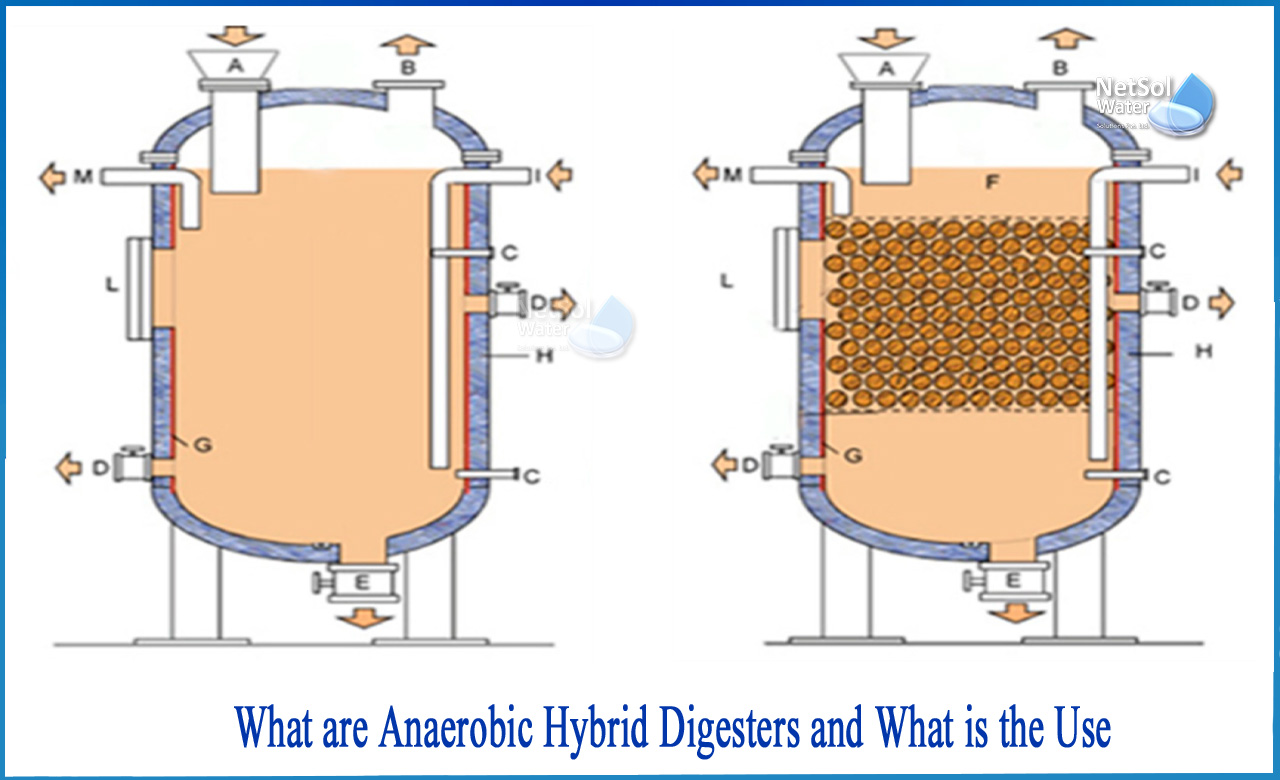What are anaerobic hybrid digesters and What is the use?
An anaerobic hybrid digester is one that combines a free moving zone with a fixed media zone. This combination is an advanced form that allows for improved solid retention time in waste water treatment. Anaerobic digestion is a well-established bioconversion technology for the treatment of high-strength wastewater.
The process followed
Hybrid reactor configurations combine the advantages of both suspended and attached growth systems to provide effective treatment in anaerobic waste treatment. Anaerobic sludge is present in the lower portion of the hybrid anaerobic digester and is agitated with submersible mixers.The upper portion of the hybrid anaerobic digester is filled with fixed media (open design plastic media) so that effluent, after passing through the lower portion, passes through this media where largely soluble organics are removed as well as gas/solid separation occurs.
The digestion process begins with the hydrolysis of the input materials by bacteria. Organic polymers that are insoluble, such as carbohydrates, are broken down into soluble derivatives that are then available to other bacteria. The sugars and amino acids are then converted by acidogenic bacteria into carbon dioxide, hydrogen, ammonia, and organic acids. Bacteria convert the resulting organic acids into acetic acid, along with additional ammonia, hydrogen, and carbon dioxide, among other compounds, during acetogenesis.Finally, methanogens degrade these products to produce methane and carbon dioxide. Methanogenic archaea populations are critical in anaerobic wastewater treatment.
Benefits of a hybrid anaerobic digester
· The presence of a fixed film of biomass that grows on the plastic fill media eliminates the need to develop and maintain granular sludge.
· The hybrid anaerobic digester requires significantly less time to start-up and stabilize than other high-rate anaerobic reactor technologies.
· A hybrid anaerobic digester can reduce BOD and COD (organic pollutants) by up to 90% and 70%, respectively.
· In comparison to a conventional anaerobic digester, a hybrid anaerobic digester requires less volume.
Uses of anaerobic hybrid digesters
1: Anaerobic digestion is used in the treatment of biodegradable waste and sewage sludge. Anaerobic digestion, as part of an integrated waste management system, reduces landfill gas emissions into the atmosphere. Anaerobic digesters can also be fed with energy crops grown specifically for that purpose, such as maize.
2: Anaerobic digestion is used as a source of renewable energy. The process generates biogas, which contains methane, carbon dioxide, and traces of other'contaminant' gases. This biogas can be used directly as fuel, converted to natural gas-quality biomethane, or used in combined heat and power gas engines. The nutrient-rich digestate generated can also be used as fertilizer.
3: One of the most visible environmental advantages of anaerobic digestion is its ability to reduce greenhouse gas emissions. AD operations reduce the use of fossil fuels by capturing methane gas that would otherwise be lost to the atmosphere. This helps to mitigate climate change and is extremely beneficial in all AD technology use scenarios.
4: The application of anaerobic digestion technology on farms demonstrates a series of ways in which AD can benefit the environment. As farmers work hard to meet rising food demand while remaining viable and profitable in today's global market, efficient use of water and nutrients for crop and livestock needs can reduce costs and environmental impacts while also contributing to safer, more productive farms.
Anaerobic digesters can:
· Reduce pathogens to protect animal and human health.
· Convert waste nutrients into more accessible forms for plants to use than raw manure, increasing crop productivity and yield.
· Recycle nutrients on the farm to create a food production system that is both economically and environmentally sustainable.
· Heat production, electricity generation, or fuel from biogas for on-site uses, and thus reducing the agricultural sector's reliance on fossil fuel energy.
Accept food waste from establishments such as restaurants and grocery stores. This means that less food waste is disposed of in landfills. Food waste has the added benefit of increasing farm digester efficiency.
Netsol Water is Greater Noida-based leading water & wastewater treatment plant manufacturer. We are industry's most demanding company based on client review and work quality. We are known as best commercial RO plant manufacturers, industrial RO plant manufacturer, sewage treatment plant manufacturer, Water Softener Plant Manufacturers and effluent treatment plant manufacturers. Apart from this 24x7 customer support is our USP. Call on +91-9650608473, or write us at enquiry@netsolwater.com for any support, inquiry or product-purchase related query.



